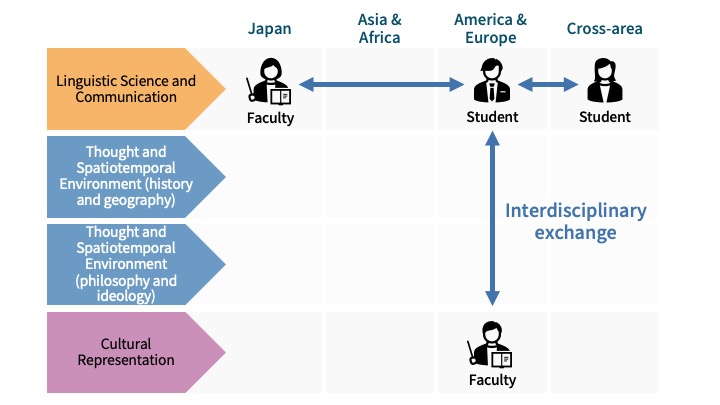


Digital Academia Unit
Digital Academia Unit Overview
The Digital Academia Unit operates a digital platform that provides reliable and steadfast support for research and education across the entire Graduate School of Humanities.
Digital Academia is an information system designed to digitize and share the academic activities of faculty members affiliated with the Graduate School of Humanities. This system categorizes research into four academic fields along the vertical axis: "Linguistic Science and Communication," "Cultural Representation," and "Thought and Spatiotemporal Environment" which branches into history and geography, and philosophy and ideology. The horizontal axis represents geographical areas: "Japan," "Asia and Africa," "America and Europe," and "Transregional Studies," resulting in a total of 16 research domains in the Academic Matrix below. Based on this matrix, research resources of faculty members are organized and made publicly available, facilitating the dissemination of information to a global audience.

Academic matrix diagram
By utilizing Digital Academia, students can expand their learning and research beyond their own specialized fields. For example, the platform enables students to easily collaborate with faculty members and researchers from different disciplines, creating opportunities for innovative joint research. Additionally, it facilitates the establishment of mentoring relationships beyond their affiliated departments, allowing for more efficient and effective research progress. Furthermore, by leveraging the multidimensional structure of the academic matrix, students can explore scholarly themes across diverse fields and regions, fostering an interdisciplinary perspective. In this way, Digital Academia serves as a powerful tool for students, helping them break through traditional academic boundaries and discover new possibilities.
Digital Academia centralizes research resources both within and beyond the Graduate School of Humanities, establishing a foundation for interdisciplinary research and education. By doing so, it supports students in exploring new academic possibilities. Furthermore, through the circulation of information on a global scale, it contributes to the international advancement of humanities research at the University of Osaka.

